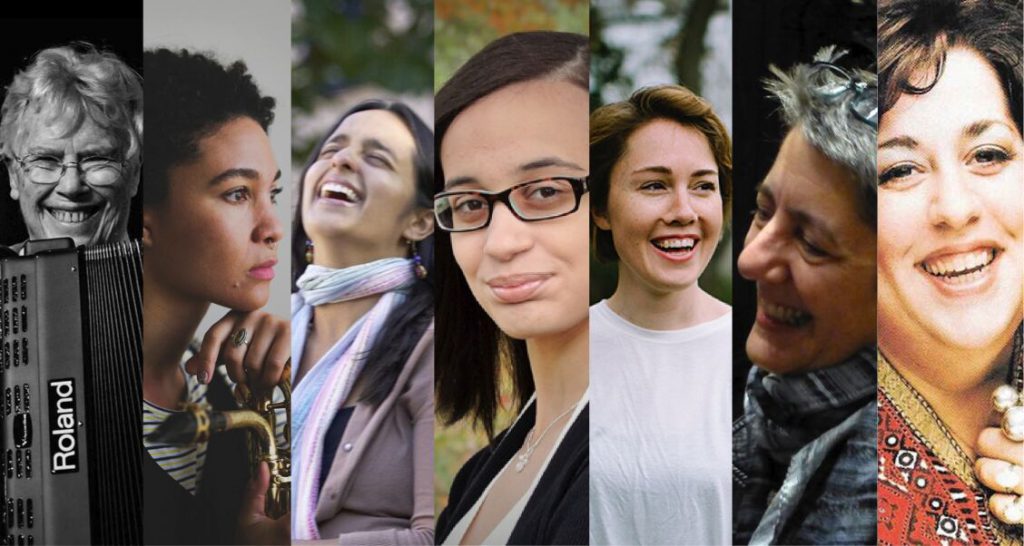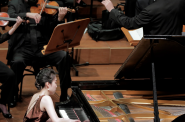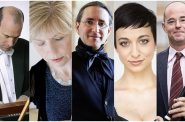Let Us Give Thanks With Present Music
Group's annual Thanksgiving concert offers works by eight different composers.

Pauline Oliveros, Shelley Washington, Reena Esmail, Lauren Barta, Caroline Shaw, Eve Beglarian and Cass Elliot. Photo from Present Music.
This Sunday Present Music will celebrate its 22nd annual Thanksgiving concert at the Cathedral of Saint John the Evangelist. Present Music Co-Artistic Director David Bloom selected the works for this concert, aided by Co-Artistic Director Eric Segnitz.
Music may be written for its own sake, as absolute music that is not explicitly about anything, enjoyed by an appreciation of its formal structure and technical construction. In contrast, Thanksgiving concerts feature extra-musical purposes. The music serves to convey an emotion, highlight the meaning of a text, or celebrate an idea. Summarizing the concert Bloom does not focus on musical aspects, “What I love most about the Thanksgiving concert is that it celebrates community, friendship, family, and togetherness.”
Many performers will participate. The Present Music Ensemble will be joined by the Bucks Native American Singing and Drumming Group, Present Music’s vocal ensemble Hearing Voices, Reagan High School’s Chamber Choir, the UW-Milwaukee’s Guitar Studio, and members of the Milwaukee Mandolin Orchestra and the Ukuladies.
The program includes many works. The concert opens traditionally with an invocation by the Bucks Native American Singing and Drumming Group. The minimalist melody, timbre, and rhythm of the drum songs combined in this cavernous venue create a visceral experience as the sound resounds through the Cathedral and presses against one’s chest.
Composer Pauline Oliveros prepared a number of Deep Listening meditations meant to “listen in every possible way to everything possible, to hear no matter what you are doing.” Her Heart Chant (1971), to be performed at this concert, calls attention to community through audience involvement. The instructions: “Place your right hand over your own heart. Place your left hand on the back of your left-hand partner (back of the heart).” Bloom anticipates “energies coming together, sharing space.”
Eve Beglarian created a multi-layer sound collage that challenges our sense of time. Asked to write a work for the 2000 millennium observance, she realized that “I knew that the only way I could really get interested in writing a piece about the millennium would be to write a piece about the meaninglessness of the idea of a uniquely important moment in time like the turning of the clock from 1999 to 2000.” She incorporated a poem by Mark Strand that is “about the rhythm of everyday life, and how we long to find meaning in it.”
The result, The Continuous Life (2000), celebrates the existential meaning of the present to all of us. Layers of sound draw upon images many of us cherish in a timeless way: children playing, doves cooing, a segment of Copland’s children’s song “All the little horses,” melodies and audio samples drawn from Beglarian’s memories of shared family experiences and more. The soundscapes are layered over a basic guitar progression. That is where the Mandolin Orchestra and Ukeladies come in.
Within the work, a reader recites a Mark Strand poem. At its heart, “the luckiest/ Thing is having been born, that you live in a blur/ Of hours and days, months and years, and believe/ It has meaning.” Beglarian discusses her choice of 16 layers of material in an online introduction to the work.
Caroline Shaw, frequently featured in Thanksgiving concerts, often uses words to explore their sounds. This time the words are chosen for their meaning. Shaw is inspired by the ideas conveyed by Claudia Rankine, in a book-length essay, Don’t Let Me Be Lonely. Words can have meaning beyond their literal sense. “Sometimes you read something and a thought that was floating around in your veins organizes itself into the sentence that reflects it.” Hence Shaw’s title, This Might Also be a Form of Dreaming (2016). Other segments root the piece in the present, “Here, I am here.” And, “the first fact of existence is neither being in itself nor being for itself but being for the other.”
Another crossover work, by Shelley Washington, was commissioned to blend traditional western instruments, flute, strings, piano with an Eastern dumbra, sabyzgy, rubab and others. The Eastern instruments are allowed to retain their usual style of improvisation as they work with the more defined score for western instruments. The title, A Kind of Lung (2017) recognizes the need for the mixed ensemble to work (breathe) together. Bloom has arranged the music to fit other non-western instruments — an American Indian frame drum and vocals.
Last year a high school chorus from Reagan High School’s Chamber Choir sang Ēriks Ešenvalds‘ Stars with choir member Lauren Barta as a soloist. Barta’s connection with Present Music reaches further. She participated in Present Music’s Creation Project and composed a string quartet in consultation with Stegnitz. Inspired by Sara Teasdale‘s text for Stars, Barta arranged a choral work from other Teasdale poetry. Premiered by the Reagan choir in the spring, the choir will reprise the work for this concert.
Now a freshman at Drake, Barta is pursuing singing, composition and environmental studies.
The penultimate work, a joyful song by Cass Elliot (of the 1960’s group The Mamas and the Papas) observes the freedom of all of us to determine our own course — Make Your Own Kind of Music (1968.) Bloom observes that we are encouraged by this concert to “take initiative, to take stock of all the good things that we have and move forward.” Elliot’s words, “Make your own kind of music, even if nobody else sings along” challenges us to act on personal choices.
By the closing drum circle, another tradition of these concerts, the threads of meaning from all of the selections come together in a carefully curated whole.
Come at 4:00 p.m. before the concert, for a Q&A with new Co-Artistic Directors, David Bloom, and Eric Segnitz and special guests.
The Thanksgiving concert begins at 5:00 p.m. at Cathedral of Saint John the Evangelist on November 17, 2019. Single Tickets are $55 (VIP) and $25 (General Admission). $10 tickets are available for “special industry, artists and musicians.” Discounts, subscriptions with additional ticket options may be arranged. Purchase online, at the door, or call 414-271-0711.
On February 13 and 14, 2020, Eric Segnitz presents an edgy, love-inspired chamber concert, featuring works by Swedish singer/composer/visual artist Sophie Duner, and post-modern love songs by Americans Corey Dargel, Carla Kihlstedt, Louis (Moondog) Hardin and John Zorn. In The Avant-garden of Love includes a premiere showing of the American 1927 avant-garde silent film, The Love of Zero, with an original live score composed by Segnitz.
Preview
-
PianoArts Festival Features Rising Stars
 May 28th, 2024 by Michael Barndt
May 28th, 2024 by Michael Barndt
-
Four Nations Ensemble Goes For Baroque
 May 13th, 2024 by Michael Barndt
May 13th, 2024 by Michael Barndt
-
Mozart on Prospect Avenue
 May 9th, 2024 by Martha Brown
May 9th, 2024 by Martha Brown



















